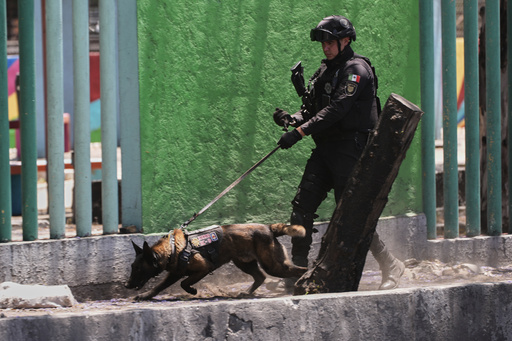In the heart of Mexico City’s historic district, a men’s clothing store received an ominous phone call that set off a chain of terrifying events. The caller demanded the store owner set aside 10,000 pesos (approximately $500) each week, warning of dire consequences if not paid. Sharply rejecting the demand, the owner affirmed that the extortion sum would have devoured half of his store’s daily profits. This refusal, however, only led to further threats, visits from thugs, and instances of armed robbery, which ultimately forced the shop owner to shutter the business that had been a family fixture since 1936.
Extortion in Mexico is crippling businesses, with a significant portion tied to powerful organized crime syndicates. While larger corporations may reluctantly consider it a business expense, smaller shops often succumb and close down. Statistics from Coparmex, the Mexican Employers’ Association, highlight that in 2023 alone, businesses incurred losses totaling $1.3 billion due to extortions. This distressing trend continues to rise, presenting a 10% increase in the initial quarter of the year when compared to the same period last year.
In Mexico City specifically, cases of extortion reported to the authorities nearly doubled within the first five months of 2025, soaring from 249 to 498 cases. This surge marks the most significant total for this part of the year in six years, based on federal crime data.
The store owner initially avoided answering calls for months, hoping to quell the threat. But by early 2020, physical demands for payment commenced as two men arrived at his store. Fearing for his safety, the owner pretended to be a shopper and discreetly exited. Persistent weekly calls resumed in 2021, threatening “security” breaches unless payments were made. Under legal counsel, the owner eventually avoided his shop entirely, opting to manage it remotely instead.
The situation worsened as robberies escalated, with employees being restrained and threatened at gunpoint while perpetrators looted the premises. After enduring two relentless years of threats and forced entries, the owner reported the matter to law enforcement. Authorities demanded evidence, which he could not provide as the threats were consistently verbal, rendering the investigation ineffective.
These instances represent only a fraction of the broader issue, as a staggering 97% of extortion cases were unreported in 2023 according to Mexico’s National Institute for Statistics and Geography. Fear and doubts about authorities’ effectiveness contribute to this underreporting. Despite efforts, Mexico City Police Chief Pablo Vázquez Camacho has acknowledged that many incidents remain unreported, rendering resolution impossible.
The president of the Mexico City Chamber of Commerce, Vicente Gutiérrez Camposeco, describes extortion as a deeply rooted issue, particularly in the capital. Daniel Bernardi, whose family has owned a popsicle shop for generations, voiced resignation to the practice, stating that payment, when demanded, felt inevitable.
In recent efforts to combat the situation, a special prosecutor’s office was established by Mexico City authorities to focus on extortion cases. In July, President Claudia Sheinbaum proposed legislative measures to bolster government power in dealing with extortionists. Additionally, plans were announced for a national strategy, including a toll-free line for anonymous reports, instant deactivation of phone numbers associated with extortion, and the engagement of Mexico’s Financial Intelligence Unit to freeze suspect bank accounts.
Unfortunately, extortion has ballooned, flourishing within organized crime and enticing powerful syndicates, including the dominant Sinaloa and Jalisco New Generation cartels, who have integrated extortion into their array of criminal activities. The profitability of extortion also fuels smaller criminals to operate under false pretense.
Throughout this harrowing ordeal, the clothing store owner never identified the individuals or group responsible for the extortion. Without support from the authorities, he felt vulnerable and isolated, noting threats became increasingly dire, eventually including life-threatening warnings. He recounted an instance where a neighboring restaurant, established around the same time as his shop, had its owner killed for defying extortionists.
Faced with mounting threats and safety concerns, the store owner felt he had no choice but to close in December 2023. Watching as the legacy of his grandfather’s store was dismantled piece by piece, he expressed a profound sense of sadness and anger over the lost opportunities for his business, which he couldn’t continue because of the pervasive climate of fear. “You dedicate your entire life, only for it to be destroyed,” he lamented.


